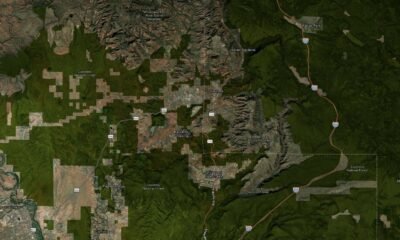Business
The True Cost of Freedom Unveiled

You can’t grasp the enormity of 122,000 names until you see them engraved on a wall.
At the National Monument to Freedom, dedicated by the Equal Justice Initiative in Montgomery, these names stretch skyward, towering three or four stories high.
Each name, sourced from the 1870 census, belonged to a former enslaved person. These are not just random names but family names. Together, they represent approximately 4 million people who emerged from the shackles of slavery.
Each name signifies an American who was once treated as property, subjected to abuse and assault under the law. Stripped, examined, and sold away from families and loved ones.
The surrounding park is a somber testament to this legacy. Visitors encounter slave cabins, a rail car used for transporting people like livestock, and myriad statistics and stories that encapsulate the grim toll of human bondage.
According to the EJI, around 6 million Americans perished as someone else’s property.
By the time you face that towering wall of names, you realize that each one represents survivors and countless others who lived and died in captivity. Each name sits atop layers of generational pain and trauma.
This led me to reflect on a phrase often heard around federal holidays like Independence Day.
Freedom isn’t free.
This slogan is frequently used to defend military actions post-9/11. However, the National Monument to Freedom offers a different perspective on its meaning.
On July 4, 1776, when the United States declared its independence, all 13 colonies allowed slavery. Even a paragraph condemning the slave trade was removed from an early draft of the Declaration of Independence. There was no condemnation of slavery itself.
Slavery did decline during the Revolution, particularly in South Carolina and Georgia. Historian Ira Berlin notes in “Generations of Captivity” that the enslaved population in Georgia diminished by two-thirds between 1775 and 1783, and by a quarter in South Carolina.
This decline was due to chaos, not ideals. Revolution disrupts state authority, making it difficult to maintain slavery. Enslaved people seized the opportunity to escape.
But war is a poor liberator. Within a decade, slavery reasserted itself in both states. There was no legislation that promised its end.
Except for the actions of enslaved Americans.
Enslaved individuals resisted in various ways, safeguarding their humanity in a system designed to strip them of it.
Two enslaved people, Mum Bett and Quock Walker, pushed Massachusetts courts to declare in 1781 and 1783 that the state’s new constitution had abolished slavery.
Black men and women, with the help of white allies, ran the Underground Railroad and risked their lives to free others from bondage.
This was never easy, nor assured of success. It took centuries to dismantle the institution. Everyone listed on the National Monument to Freedom knew someone who lived and died as someone else’s property.
By the Civil War’s eve, the perseverance of courageous individuals had led to political factions in the North committed to ending slavery.
This progress came from marginalized people demanding the respect, the rule of law, and the governance they were denied.
Freedom isn’t free. It is not typically armed conflict that advances freedom. Often, it is the efforts of those oppressed by power at its most destructive who extend the boundaries of liberty. It’s the lawyer registering voters despite oppressive regimes and the people marching for their rights against powerful opposition.
These individuals move beyond the status quo to grasp ideals that seem unattainable.
If we celebrate a free society today, it’s not due to ancient philosophers or recent battles. It’s because Americans who were not free took risks and made sacrifices that elevated the nation.
The 122,000 names on the National Monument to Freedom underscore the weight of this task and remind us that justice often begins with those who have the least of it.


















